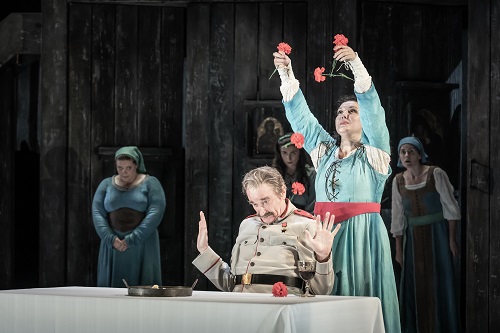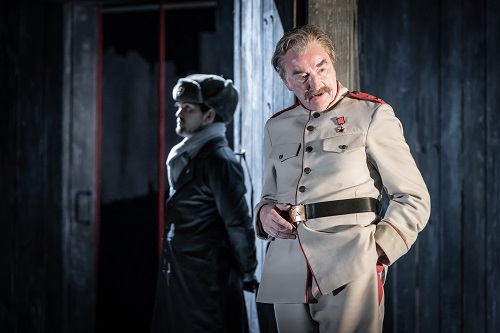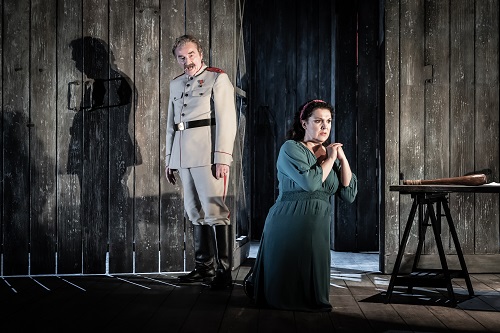Rimsky-Korsakov wrote 15 operas yet few have attained any sort of currency outside of Russia. As part of its Spaced Season 2021, Grange Park Opera presented Rimsky-Korsakov’s Ivan the Terrible and the production’s opening night on 19th June 2021 may well have been the work’s UK premiere. The production was directed by David Pountney and conducted by Mihail Tatarnikov, with Evelina Dobracheva as Olga, Carl Tanner as Tucha, David Shipley as Prince Tokmakov, Adrian Thompson as Matuta, Liubov Sokolova as Olga’s nurse, and Clive Bayley as Ivan the Terrible. Designs were by Francis O’Connor and lighting by Malcolm Rippeth.
Rimsky-Korsakov wrote the opera which he knew as Псковитя́нка (The Maid of Pskov) in the period 1868-1872, a time when he was sharing an apartment (and a piano) with Mussorgsky who was writing Boris Godunov at the same time (on the same piano). It was Rimsky-Korsakov’s first opera and he must have retained a fondness for it as he revised it in 1876/77 and created a final version in 1891/92. But the work’s history is rather more complex than this. It is based on a four-act play by Lev Mei with the first act of the play set 15 years before the action and featuring largely different characters, explaining the circumstances of the heroine Olga’s birth. For his first version, Rimsky-Korsakov omitted Mei’s first act and placed the information in narration, for the second version he created a prologue set 15 years earlier, this was not a success so for the final version he removed the prologue again. Throughout this period the opera was known by its title of The Maid of Pskov but when Serge Diaghilev presented it in Paris in 1909 as part of his Russian season there, the big draw was the bass Feodor Chaliapin as Ivan, so the opera was renamed for this character and became, in the West, Ivan the Terrible.
At David Pountney’s suggestion, Grange Park Opera performed Rimsky-Korsakov’s final version of the opera but preceded it by the prologue from the second version. The prologue tells how Vera Sheloga (Evelina Dobracheva), wife of the Boyar Ivan Sheloga (John Ieuan Jones) had an affair with a mysterious stranger (Tsar Ivan) whilst her husband was away and gave birth to her daughter Olga. When her husband returns he suspects and Vera’s sister, Nadezhda (Amy Sedgwick) claims the baby is her own and her prospective husband, Prince Tokmakov (David Shipley) accepts it. Only Tokmakov and the nurse Vlasyevna (Liubov Sokolova) feature in the main opera.
This is set 15 years later with Olga (Evelina Dobracheva, who thus played both mother and daughter) is living with her foster father Prince Tokmakov (David Shipley) who is governor of the free city of Pskov. The Tsar has just devastated the sister city of Novgorod (another free city) and there are worries about the Tsar coming. As the opera develops it places three stories alongside each other. Olga’s love for Tucha (Carl Tanner) who is a troublemaker, even though she is betrothed to Matuta (Adrian Thompson), her gradual knowledge of the circumstances of her birth and her mysterious father, and the Tsar (Clive Bayley) who finally appears in Pskov and threatens the city. The work ends with a scene where the Tsar and Olga recognise each other as father and daughter, he spares the city but Tucha’s attack with his rebels leads to the death of Olga.

It is a strange piece, and the dramaturgy is perhaps not what Verdi or Wagner would have created. Not for the first time, I was aware that Rimsky-Korsakov’s operatic priorities were rather different to the Western European operatic canon. The piece has a rich orchestral score (performed in an orchestral reduction by composer Alex Woolf) which Rimsky-Korsakov uses to great effect throughout the work. There are however no arias as such, the vocal music is in a form of continuous arioso aiming for the more naturalistic effects of the composer’s older contemporary Dargomyzhsky. The only set pieces are where music is sung by the characters, folk songs, prayers and other ensembles. And it is in these large set pieces that the work really takes off. The character of Tsar Ivan only appears mid-way through Act Two but effectively hi-jacks the opera.
Pountney’s production reflects this most effectively. For the prologue and Acts 1 and 2, the opera was set in the most traditional of 16th century Russias with a rather strikingly flexible wooden set. But from the outset, the work has strange contemporary references and the way Rimsky-Korsakov gives Ivan a monologue musing about his political methods, and the way that we see the effect the Tsar has on all those around him makes us think of more modern regimes. Rimsky-Korsakov was not above making pointed comments about absolutism (his final opera Le coq d’or is all about that), but the figure who most comes to mind is of course Stalin. Presenting a work such as this in the UK for the first time, should a production reference this or not? Pountney chose to but it quite a subtle way. When Clive Bayley’s Ivan appears he is traditionally dressed, but when he enters Tokmakov’s house he throws his robe off to reveal a Stalin-esque uniform underneath, and the final act took place in the Stalinist 1930s and even had Ivan/Stalin watching an historic black and white silent film of Ivan the Terrible killing his own son.
Evelina Dobracheva was a wonderfully appealing Olga, singing with a lovely bright freshness and she also made the narration by Vera, Olga’s mother, into gripping stuff. Olga’s struggles with her paternity and origins were finely done, and the final scene between father and daughter was rather striking, especially in the way her death leaves things unresolved. Rimsky-Korsakov was on less sure ground with the music for Olga and her lover, Tucha, this never quite achieved the rapture you wanted and despite fine work from Dobracheva and Carl Tanner, their love duet remained somewhat polite. Far more gripping was the scene where Olga’s struggle with the news that Prince Tokmakov is not her father, was counterpointed by vivid orchestral writing depicting the bells of the city being rung in warning of the Tsar’s approach, very much invoking Mussorgsky’s bell writing on Boris Godunov.

As Tucha, Carl Tanner’s heroic tenor voice felt a little underused. He was suitably ardent if a trifle too dignified, but the character is badly under written and it does not help that Tanner’s costuming made him look more like an older ruffian than an ardent revolutionary. Adrian Thompson as Matuta managed to bring a wonderful level of malevolent nastiness into each of his short scenes. David Shipley as Prince Tokmakov was perhaps slightly too young for the role but compensated with some spectacular bass singing and the sort of commanding stage presence needed for the governor. He managed to be proper but sympathetic too.
Clive Bayley had a whale of a time as Ivan/Stalin. His first scene with Shipley’s Tokmakov was wonderful in the way the two characters edged round each other, Shipley’s Tokmakov on polite tenterhooks and Bayley’s Ivan/Stalin clearly enjoying the cat and mouse game. It was the appearance of Olga and the shock she brought to Ivan that changed things (and having both Vera and Olga played by the same singer meant that we understood how much daughter resembled mother). Bayley’s Act Three account of the monologue brought to mind other bass protagonists considering the balance of ruling, Philip II in Don Carlos and the title role in Boris Godunov. A masterly performance that dominated but which remained part of the ensemble
The smaller roles were all strongly taken. Liubov Sokolova was superb as the stock nanny figure, telling stories and watching over things. We know that she knows the truth, but she never revealed it. Amy Sedgwick moved from sister to nurse, bringing fine style to both whilst John Ieuan Jones was upright and dignified both as Vera’s husband and Ivan/Stalin’s physician, with Rosie Rowell as Olga’s friend, Phil Wilcox as a courtier, Colin Murray as a messenger and Mark Bonney as a sentry.

The chorus was in fine form, and Rimsky-Korsakov’s writing is predicated on quite a large chorus with divisions (the end of Act One features choruses of loyalists and of rebels), so Grange Park Opera’s team was very hard working, making a fine noise indeed and adding lots of movement to the ensemble scenes.
In the pit, Mikhail Tatarnikov drew fine playing from the Gascoigne Orchestra (Grange Park Opera’s new ensemble based on the old Garsington Orchestra), and Alex Woolf’s reduction managed to retain the work’s richness. Tatarnikov clearly loves the score (and was audibly singing along) and made Rimsky-Korsakov’s orchestra writing flow in the best way possible.
David Pountney obviously loves this work. It is the third Rimsky-Korsakov opera that I have seen him produce (previously The Golden Cockerel at Scottish Opera and Christmas Eve at English National Opera), and each time he has brought forth something special. His linking of Ivan and Stalin was imaginatively done and we never felt preached at. Working with the available resources (the opera is written for a rather larger stage), Pountney’s stagecraft was always effective and resulted in some strongly drawn characters. My only complaint was the siting of the interval after Act Two (effectively dividing the period Tsar Ivan scenes from the 1930s Stalinist ones), which left us with a first part of nearly two hours and a second part of 45 minutes.
I did rather wonder whether adding the prologue was wise. For all Evelina Dobracheva’s moving performance as Vera, the prologue does rather delay the advent of Ivan as well as lengthening a first half which is already slow moving. Perhaps this issue returns us to the dramaturgy question which I mentioned earlier, Rimsky-Korsakov’s opera simply have different aims, it is the journey itself that counts, with all the story-telling involved, rather than the destination.
Ivan the Terrible is never going to be mainstream, but that is what festivals are for and Grange Park Opera and the team are to be congratulated on allowing us to experience a work of which Rimsky-Korsakov himself was clearly very fond.
Robert Hugill
Nicolai Rimsky-Korsakov – Ivan the Terrible (The Maid of Pskov), 1891 revision with prologue from 1876 version
Prologue: Vera – Evelina Dobracheva, Ivan Sheloga – John Ieuan Jones, Nadezhda – Amy Sedgwick, Prince Tokmakov – David Shipley, Vlasyevna – Liubov Sokolova
Opera: Olda – Evelina Dobracheva, Tucha – Carl Tanner, Prince Tokmakov – David Shipley, Vlasyevna – Liubov Sokolova, Matuta – Adrian Thompson, Perfilyevna – Amy Sedgwick, Stepanida – Rosie Rowell, Tsar Ivan – Clive Bayley, Bomely – John Ieuan Jones, Prince Afanasy – Phil Wilcox, Messenger – Colin Murray, Sentry – Mark Bonney; Director – David Poutney, Conductor – Mikhail Tatrnikov, Designer – Francis O’Connor, Lighting – Malcolm Rippeth, Grange Park Opera Chorus, The Gascoigne Orchestra.
Grange Park Opera, West Horsley; Saturday 19th June 2021.
ABOVE: Ivan the Terrible at Grange Park Opera (c) Marc Brenner